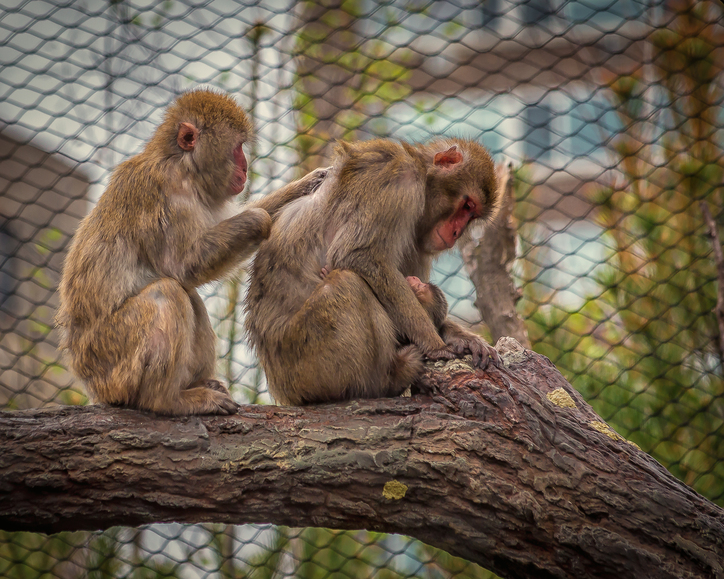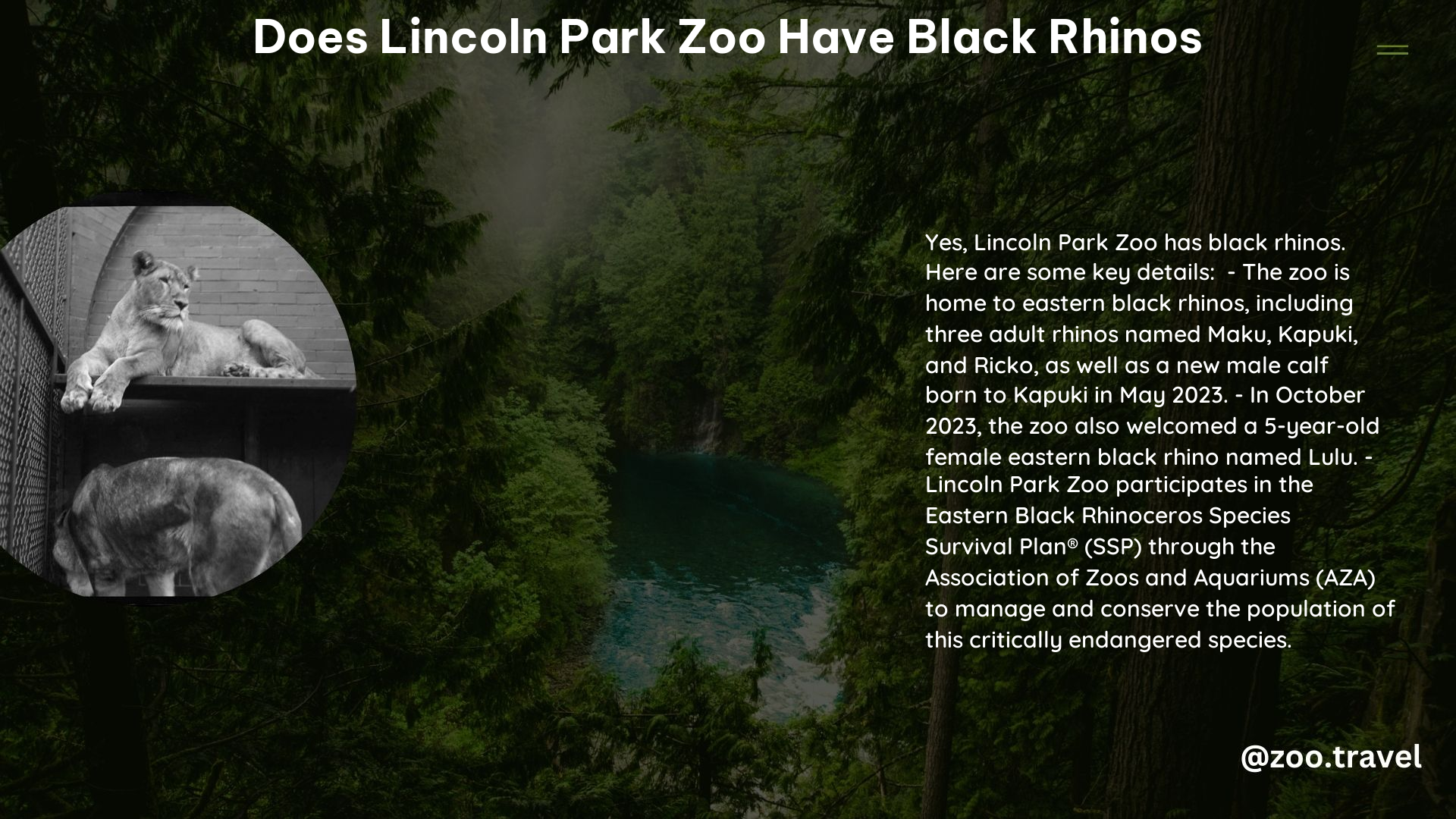Lincoln Park Zoo in Chicago is home to several eastern black rhinos, a critically endangered species. The zoo houses these magnificent creatures as part of its commitment to conservation and education. With a dedicated exhibit in the Regenstein African Journey and active participation in breeding programs, Lincoln Park Zoo plays a crucial role in protecting and preserving this iconic African species.
What Species of Black Rhino Does Lincoln Park Zoo Have?

Lincoln Park Zoo is home to the eastern black rhinoceros (Diceros bicornis michaeli), one of the three subspecies of black rhino. This subspecies is native to eastern Africa and is critically endangered due to habitat loss and poaching. The zoo’s commitment to housing and breeding these animals contributes significantly to conservation efforts for this threatened species.
How Many Black Rhinos Are Currently at Lincoln Park Zoo?

As of the latest information available, Lincoln Park Zoo houses several eastern black rhinos:
- Lulu – A 5-year-old female, transferred to the zoo on October 3, 2023
- Kapuki – An 18-year-old female
- Utenzi – A 19-year-old male
- A male calf – Born to Kapuki on May 19, 2023
This diverse group of rhinos represents different age ranges and genders, which is crucial for breeding programs and population management.
Where Are the Black Rhinos Housed at Lincoln Park Zoo?
The black rhinos at Lincoln Park Zoo reside in the Regenstein African Journey exhibit. This specially designed habitat provides:
- Indoor and outdoor spaces
- Environmental enrichment
- Opportunities for natural behaviors
- Viewing areas for zoo visitors
The exhibit aims to replicate aspects of the rhinos’ natural habitat while ensuring their comfort and safety.
What Conservation Efforts Does Lincoln Park Zoo Undertake for Black Rhinos?
Lincoln Park Zoo is actively involved in several conservation initiatives for black rhinos:
- Species Survival Plan (SSP)
- Collaborative effort with other AZA institutions
-
Manages and conserves the eastern black rhino population in captivity
-
Hormone Monitoring
- Developed technique using fecal samples
- Tracks reproductive health and stress levels
-
Has led to successful births (e.g., King in 2013, Romeo in 2019)
-
Breeding Program
- Aims to increase the captive population
-
Recent introduction of Lulu for potential breeding
-
Research and Education
- Conducts studies on rhino behavior and health
- Educates visitors about rhino conservation
Why Is Lincoln Park Zoo’s Black Rhino Program Important?
The black rhino program at Lincoln Park Zoo is crucial for several reasons:
- Conservation of a Critically Endangered Species
- Helps maintain genetic diversity
-
Contributes to global population management
-
Research Opportunities
- Allows for close study of rhino behavior and biology
-
Develops new conservation techniques
-
Public Education
- Raises awareness about rhino conservation
-
Inspires visitors to support wildlife protection
-
International Collaboration
- Participates in global conservation efforts
- Shares knowledge with other institutions
What Challenges Do Black Rhinos Face in the Wild?
Black rhinos in their natural habitats face numerous threats:
| Threat | Description | Impact |
|---|---|---|
| Poaching | Illegal hunting for rhino horns | Severe population decline |
| Habitat Loss | Destruction of natural environments | Reduced living space and resources |
| Human Conflict | Encroachment on rhino territories | Increased human-wildlife conflict |
| Limited Genetic Diversity | Small population size | Reduced adaptability and health issues |
Lincoln Park Zoo’s program helps address these challenges by maintaining a healthy captive population and supporting wild conservation efforts.
How Can Visitors Learn About Black Rhinos at Lincoln Park Zoo?
Visitors to Lincoln Park Zoo can learn about black rhinos through various means:
- Informational signage at the Regenstein African Journey exhibit
- Zookeeper talks and demonstrations
- Educational programs and workshops
- Interactive displays about rhino conservation
- Special events focused on African wildlife
These educational opportunities help visitors understand the importance of rhino conservation and how they can contribute to protection efforts.
What Success Stories Has Lincoln Park Zoo Had with Black Rhinos?
Lincoln Park Zoo has celebrated several successes with its black rhino program:
- Successful Births
- King born in 2013
- Romeo born in 2019
-
New male calf born in May 2023
-
Advancements in Hormone Monitoring
-
Developed non-invasive techniques for tracking rhino health
-
Contributions to Global Population
-
Participation in transfers and breeding recommendations
-
Research Publications
- Sharing findings on rhino behavior and health with the scientific community
These successes demonstrate the zoo’s commitment to black rhino conservation and its ability to make meaningful contributions to the species’ survival.
How Does Lincoln Park Zoo’s Black Rhino Program Compare to Other Zoos?
Lincoln Park Zoo’s black rhino program is part of a larger network of conservation efforts:
- Participates in the AZA’s Species Survival Plan
- Collaborates with other zoos for rhino transfers and breeding
- Contributes unique research and husbandry techniques
- Maintains a high standard of care for its rhinos
While many zoos participate in rhino conservation, Lincoln Park Zoo’s program is notable for its research contributions and successful breeding record.
What Future Plans Does Lincoln Park Zoo Have for Its Black Rhino Program?
Looking ahead, Lincoln Park Zoo has several goals for its black rhino program:
- Continue successful breeding efforts
- Expand research initiatives on rhino health and behavior
- Enhance visitor education programs about rhino conservation
- Strengthen partnerships with other conservation organizations
- Support in-situ conservation efforts in Africa
These plans demonstrate the zoo’s long-term commitment to black rhino conservation and its role in protecting this endangered species.
In conclusion, Lincoln Park Zoo not only houses black rhinos but plays a vital role in their conservation through breeding, research, and education. The presence of these magnificent animals at the zoo offers visitors a unique opportunity to learn about and appreciate this critically endangered species, while supporting global efforts to ensure their survival.
References:
1. Black Rhinoceros Conservation (2008-2020) | Lincoln Park Zoo
2. Lulu, Eastern Black Rhinoceros | Lincoln Park Zoo
3. Buffalo Zoo and Lincoln Park Zoo Announce Rhinoceros Transfer
